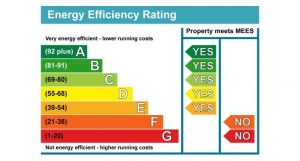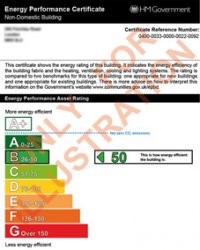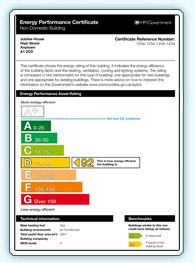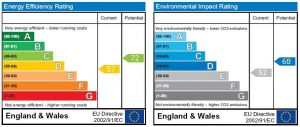What are Energy Performance Certificates (EPCs)?
An Energy Performance Certificate, otherwise known as an EPC, provides an energy rating for a residential or commercial property.
The way in which EPC legislation is applied differs between England and Wales, and Scotland.
England and Wales Residential (Domestic)
All residential properties in England and Wales require an EPC when marketed for sale or rent.
Minimum Energy Efficiency Standards (MEES)
From 1st April 2018 any property rented out in the private rented sector must have a minimum energy performance rating of E on an Energy Performance Certificate (EPC). The regulations came into force for new lets and renewals of tenancies with effect from 1st April 2018 and for all existing tenancies on 1st April 2020. It will be unlawful to rent a property which breaches the requirement for a minimum E rating, unless there is an applicable exemption. A civil penalty of up to £4,000 will be imposed for breaches.
After 1st April 2018 if a landlord lets a privately rented property which is F or G rated on a current legally required EPC then energy efficiency improvements must be carried out to bring the property up to at least an E rating before the property is rented out, unless the landlord qualifies for an exemption and the exemption is registered on the Public Exemptions Register.
Commercial (Non-Domestic)
Since the 4th of January 2009 a Commercial EPC is required upon construction, sale or lease for all non-dwellings, covering everything from small retail units to offices, industrial units and large scale commercial premises such as airports and public buildings.
A Commercial EPC provides an energy rating for a building which is based on the performance potential of that building. Services such as lighting, heating & ventilation are taken into account as well as the way in which these services are controlled. The industry standardised A to G energy rating given on the certificate will reflect the intrinsic energy performance standard of the building relative to a benchmark. This rating could then be used by potential buyers or tenants to make comparisons between properties. The Commercial EPC is accompanied by a Secondary report that provides recommendations on how the energy performance of the building could be enhanced, together with an indication of the payback period. These recommendations are provided in four categories relating to the payback period.
What does it look like?
The EPC provides a rating of the properties energy efficiency and displays this as a graph, similar to those found on kitchen appliances. It doesn’t look at the appliances, but rather the performance of the building itself in areas such as heating and lighting. Ratings come on a scale of A to G, with A being the best rating. Most homes in the UK have a band D to E rating for both the Energy Efficiency and Environmental Impact.
Home Improvements
The EPC also outlines some ideas which help to improve the building’s energy performance. Implementing these can lead to lower energy bills, reduced carbon deposits and can make homes more attractive to potential buyers.
BUILDINGS THAT DON’T NEED AN EPC I.e exempt:
- Places of worship
- Temporary buildings that will be used for less than 2 years (Require proof)
- Stand-alone buildings with total useful floor space of less than 50 square metres
- Industrial sites, workshops and non-residential agricultural buildings that don’t use a lot of energy
- Buildings that are due to be demolished (Require proof)
- Holiday accommodation that’s rented out for less than 4 months a year or is let under a licence to occupy
- Listed buildings –Check & seek advice from your Local Authority Conservation Officer if the work would alter the building’s character
- Residential buildings intended to be used less than 4 months a year. (Require proof)
Elwyn Williams BSc (Hons) DipDEA DipDEC DipNDEA TRPS
E.W.Consultancy Property Services







